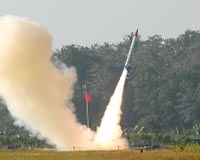 |
Seoul (AFP) July 14, 2009 South Korea will this month launch a satellite using its own rocket as part of a drive to join Asia's space race, officials said Tuesday. An experimental satellite weighing 100 kilograms (220 pounds) will be launched into a low earth orbit on July 30 from the Naro Space Centre in Goheung, 475 kilometres (300 miles) south of Seoul. "It will mark the first time that South Korea will launch a satellite from its own territory, using its own launch vehicle," Park Jeong-Joo, director of the Korea Aerospace Research Institute, told journalists. Only nine other countries have their own launch vehicles. The launch will come around four months after Seoul's rival North Korea in April fired a long-range rocket for what it called a satellite launch. Other nations said no satellite was detected in orbit and the exercise was a disguised test of a long-range Taepodong missile. The United Nations Security Council condemned the launch and tightened sanctions, prompting Pyongyang to quit a nuclear disarmament deal and to stage its second atomic test. Park said that launch was a covert missile test. "We can't put the North's rocket launch on a parallel with ours, which is purely for scientific and peaceful purposes," he said. South Korea, under a pact with the United States, is restricted to possessing military missiles with a maximum range of 300 km. The two-stage rocket was developed at a cost of some 500 billion won (388 million dollars) through cooperation with Russia, which jointly built its first stage, Park said. "We experienced a lot of difficulties in securing technology cooperation from developed countries," Park said without elaborating. "Russia turned out to be the most cooperative and willing partner in transferring technology and it has highly developed space technology," he added. South Korea has already launched 10 satellites using overseas launch sites and Park admitted this was a cheaper option. "However, if a country has to rely on foreign countries for the most fundamental space transportation systems, it would be at a big disadvantage in terms of technology protection and security," he said. The 33-metre-high rocket is scheduled to lift off between 4:40 pm and 6:37 pm on July 30, weather permitting, and fly south near Japan's Okinawa islands. Its nose fairing covering the satellite, and the first stage, should fall into waters off the Philippines 230 seconds after launch. And 540 seconds after launch, the satellite should enter an elliptical orbit 300-1,500 km above the earth. South Korea in November 2007 announced a plan to launch a lunar orbiter by 2020 and send a probe to the moon five years after that. It unveiled the project one month after China launched its first lunar orbiter and two months after Japan did. In April last year Seoul sent its first astronaut into space -- aboard a Russian Soyuz rocket. Share This Article With Planet Earth
Related Links Rocket Science News at Space-Travel.Com
 Indonesia launches rocket into space
Indonesia launches rocket into spaceJakarta (AFP) July 2, 2009 Indonesia successfully launched a home-grown rocket into space on Thursday as part of plans to send a satellite into orbit by 2014, officials said. The RX-420 rocket took off from a launch pad in Garut regency, West Java province, around 8:00am (0100 GMT). "The RX-420 rocket was successfully launched this morning. We're very happy," Aeronautics and Space Agency spokeswoman Elly ... read more |
|
| The content herein, unless otherwise known to be public domain, are Copyright 1995-2009 - SpaceDaily. AFP and UPI Wire Stories are copyright Agence France-Presse and United Press International. ESA Portal Reports are copyright European Space Agency. All NASA sourced material is public domain. Additional copyrights may apply in whole or part to other bona fide parties. Advertising does not imply endorsement,agreement or approval of any opinions, statements or information provided by SpaceDaily on any Web page published or hosted by SpaceDaily. Privacy Statement |